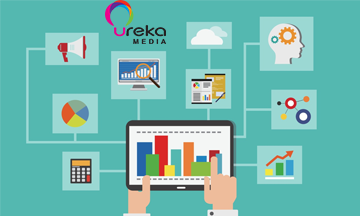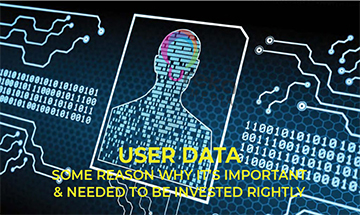


Make people SEE and REMEMBER the brand



Get people to UNDERSTAND and
WANT the brand



Change people's BEHAVIOR and
get them to CONVERT



Take care of people to CONVERT OFTEN and
ADVOCATE the brand
U News
Why Real-Time Engagement Is the Future of B-to-B Marketing
5 keys to a successful strategy

Long gone are the days when b-to-b companies could just poach successful salespeople—with their big Rolodexes of past customers—who then close deals within 12 to 18 months. Today, the sales cycle entails software-driven processes that last only around three or four months.
Not only have things sped up considerably, but the marketing landscape has also become much more complicated. Practitioners need to be adept at targeted online advertising to stay competitive; for instance, eMarketer recently revealed b-to-b digital ads will hit $4.6 billion in 2018, up 13 percent from last year’s $4.07 billion. B-to-b players need to know how to mix ads with well-timed content on LinkedIn, Google and Facebook while constantly becoming knowledgeable about other kinds of emerging tech. Also, marketers’ North Star should be reaching prospects and customers “in the moment,” or during their purchase-oriented decisions.
B-to-b has long trailed b-to-c in digital sophistication, which is why a business-to-business company that we work with is particularly noteworthy. The Fortune 500 brand largely targets SMBs and has 50 million leads and customers, and, in the last few years, it has achieved 1:1 marketing across the many channels most brands now use. The proof is in the pudding: The company’s’ revenues have risen double-digit percentage points in the last couple of years, while its stock price has jumped nearly 20 percent.
How can companies accomplish similar feats? Here are 4 keys for how b-to-b players can be equally successful in real-time engagement:
1. Moments drive growth
After prospects respond to an ad or another marketing effort, time is of the essence. It is expected that within five minutes or less, really in a minute, brands reply to a prospect with a hearty “Thank You, [First Name]” message and then follow up with another thoughtful response. The second reply could involve a digital message that offers more product information or marketplace insights, or it could be a call from a rep who has real-time data about what the prospect is looking for.
If prospects visit a service provider’s digital property and ultimately do not get important questions answered, you can expect they’re heading over to a competitor’s digital property. It is up to b-to-b sellers to personalize the experience and ask, “Were you happy with the ebook that you downloaded?” Or, “Did the webinar answer your questions?” For in-the-moment marketing, this style of attention to detail is everything.
2. ABM pushes the needle
One great way of executing such quick and relevant follow-up messaging is accounts-based marketing (ABM), which is a software-powered strategy that concentrates sales and marketing efforts on a clearly defined and limited set of prospects while delivering the right messages at the right time. To give one numerical possibility about what “limited set of prospects” means, martech tools can help b-to-b players target the best 2,500 prospects with custom messaging instead of 25,000 or 250,000 prospects in a less-than-personal way.
The best prospects will be selected due to important criteria such as a prospect’s growth potential and churn-out probability. Per a study by ITSMA and the ABM Leadership Alliance, 87 percent of b-to-b marketers said ABM efforts delivered higher ROI than other types of marketing.
3. AI make things easier
ABM is increasingly powered by artificial intelligence, helping marketers find the best customers in an ocean of potential ones through machine-learning-based predictive analysis. While extreme opinions are out there, AI is neither a pandemic that will spread and take marketers’ jobs nor a panacea that’s going to perfect them.
The fact of the matter is that AI will strengthen marketers who harness its abilities to do their jobs better. It will free them up from cumbersome chores like A/B testing to focus more on campaign creative. And such freedom bolsters the bottom line: a McKinsey Global Institute survey of 3,073 executives found that the early AI adopters were 3.5 times more likely than others to expect profit margin to grow by up to five percentage points in the near future.
4. B-to-c-styled tactics bolster messaging
Marketing categories, meanwhile, are colliding. Researchers have found that 80 percent of b-to-b buyers demand the same personalized, cross-channel customer journey that b-to-c buyers enjoy. With that in mind, marketers need to start using tactics like text messaging and mobile app notifications to enhance the experience for prospects that opt into to such communications.
Through registration data, let’s say you know that dozens of Gen Y-aged marketers attended your webinar; well, chances are that email is not the tool that demographic is going to prefer for their next communication. Right after the webinar, send them a text or app notification, saying, “Thank you, [First Name], for attending the webinar! Can I answer any other questions for you?”
5. Organizational alignment and best-in-class tech
Finally, it’s worth noting that, even with all of the keys above in place, it’s imperative that sales and marketing teams are aligned in their strategic goals with the C-Suite and IT division. Altogether, they need to use best-in-class tech to be in the moment with prospects and customers, employing software to enrich profile data, advertise in a targeted way, nurture leads, accrue engagement data in sales automation systems, convert to sale and administer smart CRM.
They also need to demand answers from their vendors around a few key questions. “What have you done for me on ABM? What do you really have to offer me with AI? How are you going to help me engage prospects and customers at key junctures in their purchase decisions?”
And if the answers are not good enough, it’s time to move on and solve your problems. It’s 2018, marketers—it’s time to be in the moment.
Source: Adweek
Related Post
Recent Post
![[Data Driven Marketing] A Data-Driven Approach To Customer Retention](https://urekamedia.com.my/uploads/uploads_image/20180627/20180627102401_28870.png)

![[PERFORMANCE BASED ADS] APPLICATIONS OF ARTIFICIAL INTELLIGENCE IN MARKETING: CONSUMER INSIGHTS](https://urekamedia.com.my/uploads/uploads_image/20180416/20180416122722_69450.png)
![[PERFORMANCE BASED ADS] 15 CÁCH TỐI ƯU QUẢNG CÁO FACEBOOK MANG LẠI HIỆU QUẢ (PHẦN 1)](https://urekamedia.com.my/uploads/uploads_image/20180326/20180326150357_40318.png)







